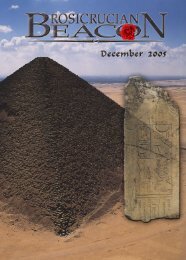Part 2 - AMORC
Part 2 - AMORC
Part 2 - AMORC
Create successful ePaper yourself
Turn your PDF publications into a flip-book with our unique Google optimized e-Paper software.
TAGORE: Thus duality is in the depths of existence,the contradiction of free impulse and the directivewill which works upon it and evolves an orderlyscheme of things.EINSTEIN: Modern physics would not say theyare contradictory. Clouds look as one from adistance, but if you see them nearby, they showthemselves as disorderly drops of water.TAGORE: I find a parallel in human psychology.Our passions and desires are unruly, butour character subdues these elements into aharmonious whole. Does something similarto this happen in the physical world? Are theelements rebellious, dynamic with individualimpulse? And is there a principle in the physicalworld which dominates them and puts them intoan orderly organisation?EINSTEIN: Even the elements are not withoutstatistical order; elements of radium will alwaysmaintain their specific order, now and everonward, just as they have done all along. There isthen a statistical order in the elements.TAGORE: Otherwise, the drama of existencewould be too desultory. It is the constant harmonyof chance and determination which makes iteternally new and living.EINSTEIN: I believe that whatever we do or livefor has its causality; it is good however that wecannot see through to it.TAGORE: There is in human affairs an element ofelasticity also, some freedom within a small rangewhich is for the expression of our personality. Itis like the musical system in India, which is notso rigidly fixed as western music. Our composersgive a certain definite outline, a system of melodyand rhythmic arrangement, and within a certainlimit the player can improvise upon it. He mustbe one with the law of that particular melody; andthen he can give spontaneous expression to hismusical feeling within the prescribed regulation.We praise the composer for his genius in creatinga foundation along with a superstructure ofmelodies, but we expect from the player hisown skill in the creation of variations of melodicflourish and ornamentation. In creation we followthe central law of existence, but if we do not cutourselves adrift from it, we can have sufficientfreedom within the limits of our personality forthe fullest self-expression.EINSTEIN: That is possible only when there isa strong artistic tradition in music to guide thepeople’s mind. In Europe, music has strayedtoo far from popular art and popular feelingand has become something like a secret art withconventions and traditions of its own.TAGORE: You have to be absolutely obedient tothis too complicated music. In India, the measureof a singer’s freedom is in his own creativepersonality. He can sing the composer’s song ashis own if he has the power creatively to asserthimself in his interpretation of the general law ofthe melody which he is given to interpret.EINSTEIN: It requires a very high standard of artto realise fully the great idea in the original music,so that one can make variations upon it. In ourcountry, the variations are often prescribed.TAGORE: If in our conduct we can follow thelaw of goodness, we can have real liberty of selfexpression.The principle of conduct is there, butthe character which makes it true and individualis our own creation. In our music there is a dualityof freedom and prescribed order.EINSTEIN: Are the words of a song also free? Imean to say, is the singer at liberty to add his ownwords to the song which he is singing?TAGORE: Yes. In Bengal we have a kind ofsong, we call it kirtan, which gives freedom tothe singer to introduce parenthetical comments,phrases not in the original song. This occasionsgreat enthusiasm, since the audience is constantlythrilled by some beautiful, spontaneous sentimentadded by the singer.EINSTEIN: Is the metrical form quite severe?TAGORE: Yes, quite. You cannot exceed the limitsof versification; the singer in all his variationsmust keep the rhythm and the time, which isfixed. In European music you have a comparativeliberty with time, but not with melody.EINSTEIN: Can the Indian music be sung withoutwords? Can one understand a song withoutwords?TAGORE: Yes, we have songs with unmeaningwords, sounds which just help to act as carriers ofthe notes. In North India, music is an independentart, not the interpretation of words and thoughts,as in Bengal. The music is very intricate and subtleand is a complete world of melody by itself.The Rosicrucian Beacon -- June 200843











